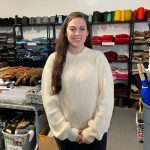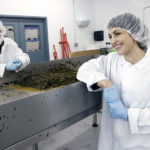It takes precisely two minutes of introductory telephone chit-chat for Sharon Rowe, a Westchester County, New York, entrepreneur and mom of two grown children, to reveal her personality to me. “I was just in Soho,” she tells me, referring to the New York City neighborhood where The Story Exchange‘s office is based, and the whole area — maybe because pandemic restrictions are loosening, or perhaps because New York just legalized recreational marijuana — “reeked of weed.”
I wait for her to lodge a complaint, but then Rowe starts to chuckle. She is, after all, a child of the 60s. While some guys on the street corner had stared at her like “I was some middle-aged woman,” she continues, “I felt like saying, ‘Hey, I’ve got five plants growing at home.'”
Rowe, it would seem, has always had an uncanny knack for being a few steps ahead of the zeitgeist. Over 30 years ago, disgusted by plastic bags she saw littering city streets and clinging to tree branches, she founded Eco-Bags Products Inc. (motto: “Cleaning up the planet one bag at a time.”). Her goal was to produce responsibly made cloth shopping bags that consumers could reuse.
The challenge: It was 1989. George Bush Senior had just been elected. Bottled water (another environmental hazard) wasn’t even a fad yet. It would be 15 years before the reusable shopping bag trend would truly catch on, turning Eco-Bags into a multimillion-dollar business with wholesale clients like Whole Foods, Estee Lauder and King Arthur Flour.
I ask Rowe what it’s like, to be so ahead of a movement. And her answer is honest but strikingly modest. As a maker of one of the few plastic-bag-alternatives on the market at the time, Eco-Bags became involved in high-profile efforts to ban plastic bags, including in Ireland and Modbury, England, in the early 2000s and then later back in the U.S., where bag-waste-reduction legislation is just going into effect (New York State, for example, just banned plastic bags in 2020). “We were a part of a lot of that,” she says, simply.
In other words, she wasn’t just ahead of the movement. She pioneered the movement.
How It Started
Rowe didn’t set out to be any sort of visionary CEO — and, in fact, she doesn’t have any formal business training. In 1981, she moved to New York City from her home state of Connecticut to become an actor. She trained in improvisation. “That was a long, hard road,” she says. “I learned how to deal with no, a lot.”
Between auditions, Rowe took office jobs to pay the bills. “I remember wearing those suits with the padded shoulders,” she says. “I looked awful.” After marrying in 1986 and then having her first child, she decided to work remotely from home — again, something not many people were doing yet. But when her boss questioned her commitment, she quit. “It’s not like we had the financial resources,” says Rowe, whose husband was working as a musician and freelance teacher. “It’s just like, ‘I had enough.’”
That was around the time when she noticed all the garbage in Washington Heights, her Upper Manhattan neighborhood. “When you’ve just had a kid, your olfactory glands are really aware,” she says. Plus, markets had just switched from traditional paper shopping bags to plastic — and now, the bags were everywhere, even “clogging gutters,” she recalls. With no alternative for bringing groceries home, “I thought, ‘there’s got to be another way.’”
Rowe had traveled in Europe when she was younger, and remembered shoppers there using net market totes called “filet” bags. Taking a chance, she found a German supplier who could ship to the U.S., plunked down $1,000 for her first big order and set up a table at a New York City street fair marking the 20th anniversary of Earth Day in 1990. “We sold out, like, in four hours,” she says. “We were selling hand over fist.”
After that, “I would go to all the natural products shows and sell, sell, sell,” Rowe says. “People would give us orders on the floor.” Soon Eco-Bag’s market totes were picked up by UNFI, a wholesale distributor. The company grew slowly, adding variations of bags (cotton, canvas, etc) pulling in about $800,000 in annual revenue by the late 2000s.
Finally, consumer sentiment caught up with her. What’s more, working with a publicist, Rowe managed to get her bags on Oprah Winfrey’s talk show in 2008. “Our sales basically tripled overnight,” Rowe says, to about $3 million a year. “We learned how to answer the phone and say, ‘We’re a little back-ordered right now.'”
Building a Legacy
But Eco-Bags, which eventually saw plenty of competition, was never just about shopping bags, even though that’s the company’s main product. “We never set out to be the Walmart of bags — we set out to be a conversation sparker,” Rowe says. Back in 1989, “there was no research or knowledge of a plastic problem. There was no conversation about producing sustainably with fair wage and fair labor. None of these conversations were happening.”
Rowe says she drew upon scene-study techniques learned in acting to connect the concept of caring about the environment to a tangible object like a shopping bag. “As an actor, if you can associate an action with an activity, it goes deeper,” she says. For instance, an actor might demonstrate anger in a scene by jamming keys into a door or violently doing dishes. In the same way, “we picked a consumer product because it’s literally something you can put your hands on.”
These days, following the pandemic, Rowe is re-starting her business, which is a certified B Corp. Last year, when revenue dropped 70%, she tapped into a Personal Paycheck Program loan to keep afloat. While her staff is small — just five people, plus a contingent of consultants — she was forced to lay off an employee. “Covid knocked the wind out of me after being in business for 30 years,” she says.
She has kept herself busy (and reduced stress) by hiking, walking the dog and painting — “all the things middle-aged women do,” she says, again with a laugh. “I haven’t quite started a pottery class but I’m tempted.”
But orders are slowly coming back — in fact, King Arthur Flour, which has seen a spike in sales thanks to pandemic baking, recently placed an order for 40,000 drawstring bags for its “Bake for Good” student program. And Rowe is hopeful that Green New Deal proposals in Washington will raise further environmental awareness. She’d like to potentially “hand over the keys” perhaps to a partner or buyer down the road. “What I set out to do, I did,” she says. “I sparked a conversation. That [is] my legacy.”
SHARON: Everyone should have access to clean air and clean water, be able to go to parks where there's no trash, be able to go to the ocean and not have garbage and be able to breathe.
TITLE: Sharon Rowe – Founder + CEO – Eco-Bags Products – Croton, New York
SHARON: When I started Eco Bags, there was no research or knowledge of a plastic problem. There was no conversation about producing sustainably. We just wanted to give people an option so they wouldn't have to create as much trash. We wanted to create products that matter and that shift culture.
SUE (FROM TAPE): All that in a bag.
SHARON (FROM TAPE): All that in the bag.
SHARON: There's the filet, there's canvas bags, there’s certified organic, there’s recycled, there's bread bags, things with zippers, things with buttons. There's over the shoulder, there's a million variations.
TEXT: Sharon grew up in Connecticut and wanted to be an actor.
TEXT: In 1981 she moved to New York City to pursue her dream.
SHARON: I learned how to deal with “No” a lot. I did a lot of “job jobs,” I called them. I learned what it was like to be a woman looking for work in New York City. Not great.
TEXT: By 1989, Sharon was living uptown, married with her first child.
SHARON: There was just so much garbage in the street. And what I noticed specifically: it was plastic bags. There were plastic bags in the street, clogging the gutters, stuck in the trees; but I had no alternative to bring my groceries home. And I thought, "There's got to be another way."
TEXT: Sharon had seen string bags when she was traveling in Europe.
SHARON: I looked all over the United States for manufacturing for what I wanted, specifically the string bag, the filet bag. I came up empty.
TEXT: Sharon eventually found a supplier in Germany.
TEXT: With $2,000 in savings, and a handful of credit cards, she founded Eco-Bags Products in 1989.
SHARON: I found out about Earth Day 1990. I set up a table on Sixth Avenue with all my bags and we sold out like, in four hours. We were selling hand over fist.
TEXT: Sharon built the business slowly to have time for her family.
TEXT: She moved production to a manufacturer in India.
SHARON: Working with India has been phenomenal. We found some really amazing, honest, hardworking people who are really invested in their community and the work that they provide for people.
TEXT: By 2008 company sales were around $800,000 a year.
TEXT: Then Sharon managed to get her products placed on the Oprah Winfrey Show.
SHARON: Our reusable bag Eco-Bag was displayed on a table. Oprah walked by and said, "Well, that's a really good idea. Bring your own bag to the store. Why use single-use and toss bags?" Our sales basically tripled overnight, phones wouldn't stop ringing. We didn't even have enough inventory.
TEXT: Sales soared to nearly $3 million a year.
TEXT: By 2020 Sharon had 7 full-time staff.
TEXT: Then everything skidded to a halt as Covid raced around the world.
SHARON: It's March 13th, and we leave the office, and that was it. I came home and I was in a fog. My heart, every thing hurt.
SHARON: I'd been through the recession so I knew that you have to act fast and be very deliberate and just figure it out. But no orders were coming in. So what did we do? I started working on all the financial pieces and taking care of that.
TEXT: Revenues dropped 70 percent.
SHARON: I think for the first month..."What was going to happen?" We just started hiking a lot. We went out, my dog would look at me like, "Another walk?"
TEXT: As the U.S. starts emerging from the pandemic, orders are slowly coming back.
SHARON: People are bringing their own bags. They're thinking. People are thinking. It's not just about the bag. It's about the bag and it's about everything you put in the bag. It's about making thoughtful decisions. What I set out to do, I did; I sparked a conversation. And that is my legacy.




